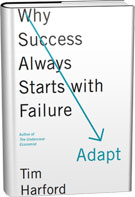Tim Harford on Trial, Error and Our “God Complex”
Financial Times journalist Tim Harford and author of “Adapt: Why Success Always Starts With Failure” argues that companies that have a God complex look for smart people (what he calls “little Gods”) to solve complex problems — when what they should really be doing is establishing systematic processes of trial and error.
Gary Loveman, who earned a Ph.D. in economics at MIT and now heads up Caesars Entertainment, has chimed in regularly on the value of small-scale testing of initiatives. His casinos will set up trials, run numbers on how they worked and implement only the best ideas company-wide.
Loveman doesn’t understand why more people don’t try things and measure the results. “There’s a romantic appreciation for instinct and, frankly, an absence of rigor for the application of more scientific approaches,” Loveman said recently (see In Experiments We Trust: From Intuit to Harrah’s Casinos).

Forget the idea that one person or even a smart team has the brains and education to think through a complex challenge. Establish, instead, a process that forces the consideration of many options. Narrow in on the best only after first considering and rejecting the many.
Here’s an excerpt of a Harford’s TEDGlobal 2011 talk last month on the topic of “Trial, error and the God complex”:
So let’s say you wanted to make detergent. Let’s say you’re Unilever and you want to make detergent in a factory near Liverpool. How do you do it? Well you have this great big tank full of liquid detergent. You pump it at a high pressure through a nozzle. You create a spray of detergent. Then the spray dries. It turns into powder. It falls to the floor. You scoop it up. You put it in cardboard boxes. You sell it at a supermarket. You make lots of money.
How do you design that nozzle? It turns out to be very important. Now if you ascribe to the God complex, what you do is you find yourself a little God. You find yourself a mathematician; you find yourself a physicist — somebody who understands the dynamics of this fluid. And he will, or she will, calculate the optimal design of the nozzle. Now Unilever did this and it didn’t work — too complicated. Even this problem, too complicated.

Comment (1)
Tim Harford on Trial, Error and Our “God Complex” – Improvisations – MIT Sloan Management Review | Accounting and Small Business /Beverly Shares